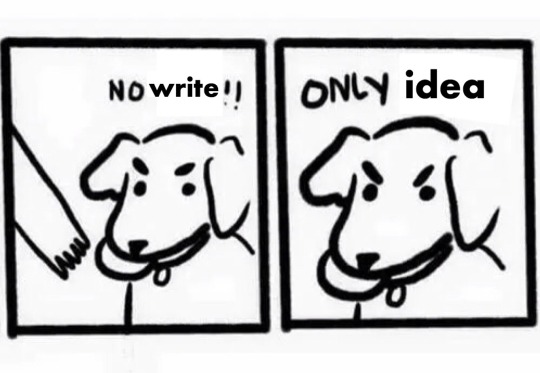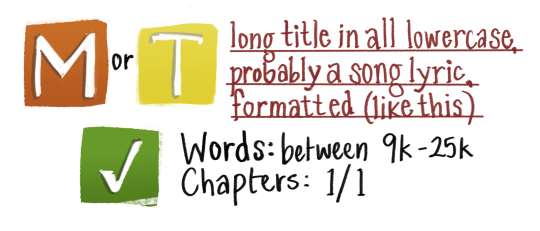Text
one of the best pieces of writing advice i’ve ever gotten:
if a scene isn’t working, change the weather.
it sounds stupid, but seriously, it works. thank u to my screenwriting professor for this wisdom
30K notes
·
View notes
Note
fem!maylor bookstore AU 🌹✨
brianna collects words.
she lives them, breathes them, puts them on like pretty dresses. she is anne carson, she is virginia woolf, hélène cixous, mary szybist—
on the dust of my pillowslip. i onlydream of your ankles brushed by dark violets,of honeybees above you
—and it makes her feel pretty, makes her feel alive.
there’s a new bookstore close to her flat, and she’s shaking a little as she stands in front of it for the first time. she looks through the windows—the store is tiny but not dark, and the rows and rows of books make her heart beat faster.
she doesn’t go in, not today. she’d applied for a position there but never heard back, and it still hurts a little. not that she’d have the time anyway—she’s got uni and a tutoring job already, and she’d spend all of her wages on books instead of rent. a woman behind her tries to get to the door, and brianna steps away with an apologetic smile.
/
the next time she passes she goes inside. there’s a small café table tucked into one corner, an old man drinking coffee. the girl behind the counter is pretty, and she’s greeting brianna like they’re friends. brianna instantly dislikes her.
the poetry section catches her attention, lures her in, and brianna’s in awe. she wants so much, the spines of the books a pretty blur, smooth under her fingers.
“looking for anything in particular?” the girl asks, touching brianna’s arm. it’s more than a little inappropriate, brianna thinks, rubbing at her skin to stop it from tingling.
“my name’s regina,” is what’s offered then, and brianna squints at her. she doesn’t look like a regina, and brianna wonders if she’s lying. she opens her mouth, forces the words out,
“just browsing.” she doesn’t intend to be rude, but something about the girl irks her. brianna smiles her thanks, then turns back to the shelf.
“can i have your name?” the girl’s smiling—grinning, actually, with the tip of her tongue behind her front teeth—when brianna turns around, slowly, staring.
“no?” it comes out like a question.
“oh,” the girl says, not sounding like she minds. “your hair is so pretty.”
“can i help you?” brianna asks her slowly. she’s pretty sure she’s not supposed to be asking that question, but she suspects the girl’s a bit daft.
the laugh startles her.
“call me if you need anything.”
/
brianna doesn’t come back for another week. she’s been busy, is all—coursework and tutoring, life, reading, reading—
ALL THE WORLD BEGAN WITH A YES. ONE MOLECULE SAID YES TO ANOTHER MOLECULE and life was born.
—sometimes the skin on her upper arm tingles, and the words swim on the page before her and she is annoyed.
when she comes back, it’s with the intention of being nice. brianna is a nice girl; her nails are clean and she’s got manners and potted plants and curly hair that people always want to touch. she lets them, for the most part.
she’s brought a notebook and her readings and earphones in case the girl is there to bother her again. she orders coffee, says please and thank you, doesn’t leave when she’s greeted with a grin and, “you’re back!”.
“have you read this?” the blond hair is tied in a high pony tail that swishes when she walks towards brianna, coffee in her hand and a book tucked under her arm. it’s to the lighthouse, and brianna stares at her, dumbly. she continues,
“i don’t even read,”
and brianna goes home and meditates on the unfairness on it all.
/
over the next few weeks, she learns to not mind so much. regina is seemingly always at work, and she’s always, always up for a chat—as soon as brianna looks up she’s there, touchy and chatty, pulling a chair to her table when she takes her earphones out, asking her what she’s reading, if her coursework is fun, if she wants another refill.
a few days in, brianna reluctantly trades her name for a cup of coffee after realising she forgot her wallet, and regina is positively grinning, so much that brianna instantly regrets it.
“here you go, brianna”—she says her name all the time now that she knows, says it with the same pleased smile.
you’re so annoying, is what brianna thinks, wonders what would happen if she said the words out loud, if regina would even care.
“i love your name, it’s so pretty,” she’s saying. her eyelashes are impossibly long, the tips so light brianna hasn’t noticed before. “it really suits you. i don’t like mine.”
she makes a face, pretty features screwing up.
“regina. i prefer reg.”
/
it’s hot outside one day, and reg is wearing short sleeves. there’s a cluster of violets tattooed on the inside of her forearm where the skin is paler than the rest.
“do you like it?” brianna’s eyes snap away guiltily, but she knows reg is smiling. “i bet you’ve got a secret tattoo. a line from your favourite book, something like that. a beatles lyric.”
brianna scoffs. “i don’t listen to the beatles.”
reg looks offended, almost. “what’s wrong with you?”
stung, brianna turns away. regina lets her browse in peace for a few minutes, then heaves a great big sigh that’s positively irksome and places herself right in front of her.
“you’re always looking at that book.”
brianna’s embarrassed, the skin at the back of her neck prickling with defensiveness. it’s not like she’s there a lot, no more than three times a week, and regina can’t exactly accuse her of never buying anything. she buys coffee, more than she can afford, and she’s not breaking anything, just looking.
“yeah, well.” brianna tightens her grip on the book. “it’s pretty.”
it is pretty, and so are the words; she must’ve read the first few lines a hundred times by now—
I won’t prepare you by revealing myself to you in a bound-about closeness,
—they make her breath catch, and she’s not sure she could bear to read on even if she took the book home.
“you can use my staff discount if you want.”
brianna looks up sharply, the “why” spitting from her lips so very ugly, so full of sharp edges.
regina merely shrugs. “you’re gonna buy it eventually, aren’t you?”
brianna’s cheeks burn. it’s not even expensive, and really, she can afford it, only she’s promised herself not to buy anymore books—
“you can help me,” regina is saying, tugging the book from her hands. “i never know what to say when customers ask for recommendations. you read all the time.”
brianna frowns. “you’re gonna call me every time a customer needs help? what exactly does this job entail?”
“great customer service?” reg grins, and brianna rolls her eyes, willing the corners of her lips to stay down.
she takes the book back, their hands brushing. “you can’t recommend something you don’t know.”
brianna expects her to interrupt—”brianna, i do it every single day, brianna, i hate reading”—but she doesn’t, just looks at her, tip of her tongue behind her front teeth.
something flutters in brianna’s stomach, annoyingly, and her mind provides her with words, soothingly—
Tireless, tied, as a moon-bound sea moves on its root.
—and then are other words, not her own and not from books or journals or pretty poetry collections, but regina’s words, soft and teasing,
“what are you gonna do about it?”
Sweet mother, I cannot weave—
send me an au and i’ll give you 5+ headcanons about it
#oh shit this is beautiful#haven't read any fanfic in a while and i come back to this#bruh#the beauty of it all#god i forgot how i used to tag stuff#maylor#fic#fave#that should cover it?#edit: i also really love the book quotes#quotes in fanfic is something that really gets me lol
30 notes
·
View notes
Note
have my eggs poached for breakfast
i guess
1 note
·
View note
Text
Color Synonyms
White
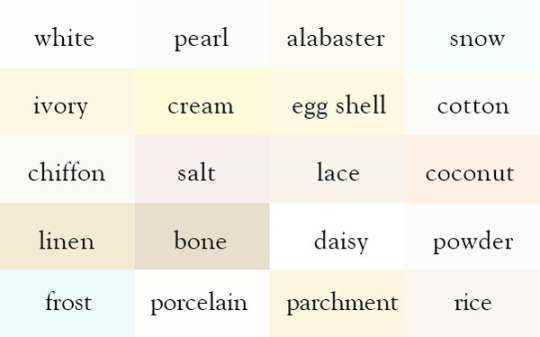
also: pale; blanched; sallow; pallid; waxen; spectral; translucent; albino;
Grey
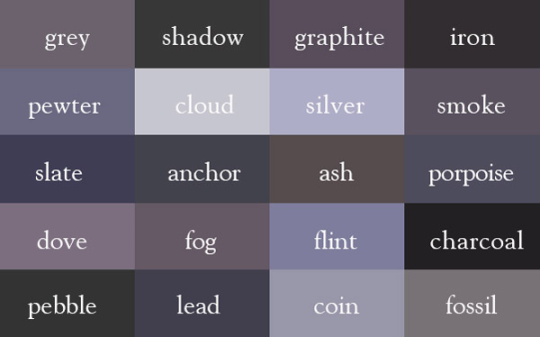
also: dust; stone; pepper;
Black

also: coal; slate; dusky; ebon; shadow; murky;
Tan
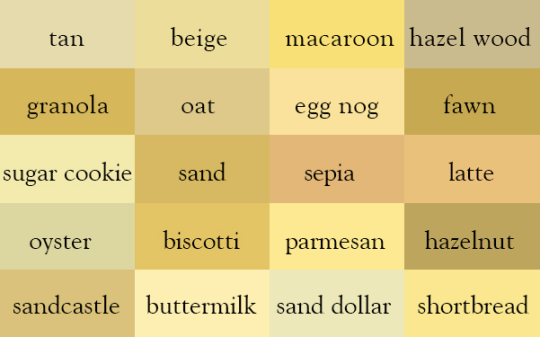
also: flesh; khaki; cream; tawny;
Brown
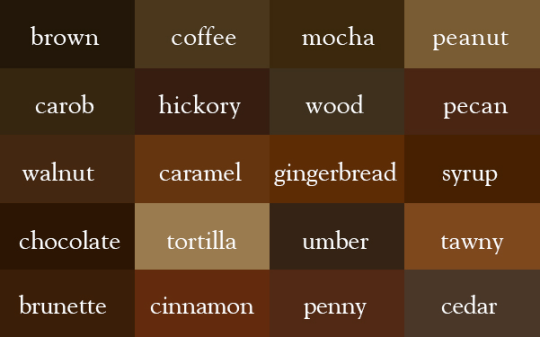
also: henna; russet; sepia; chestnut; cocoa; drab; bronze;
Red
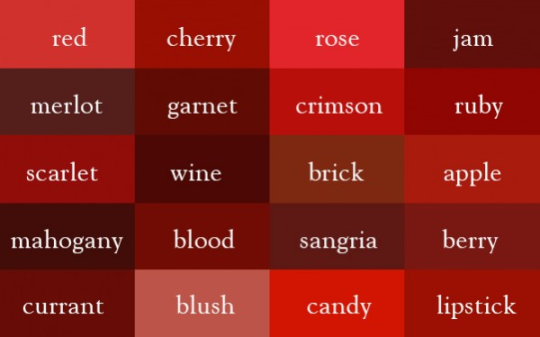
also: terracotta ; rouge; carmine; fire-engine; ruddy
Orange
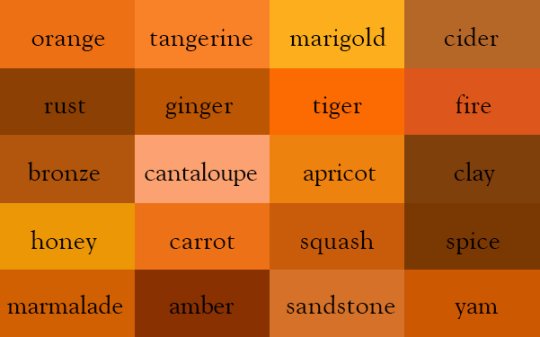
also: pumpkin ; rust ;
Yellow

also: sunny; amber; saffron; hay; straw; platinum;
Green
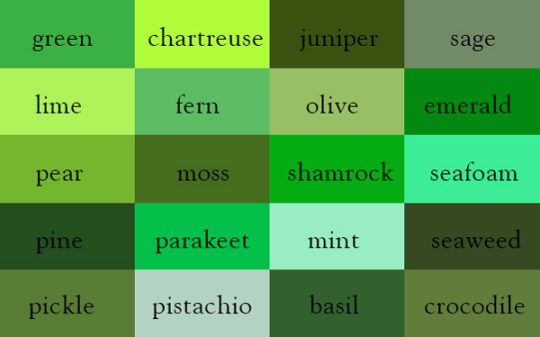
also: viridescent; grass; jade; forest;
Blue
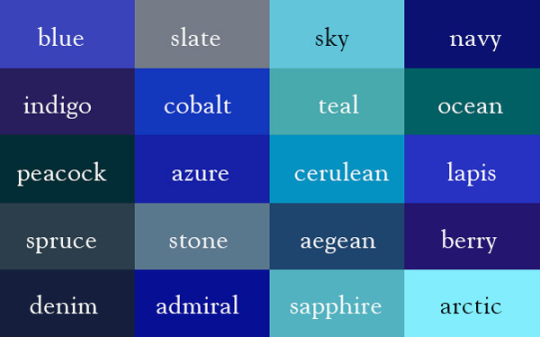
also: turquoise; cyan; ultramarine; royal; aqua; aquamarine;
Purple
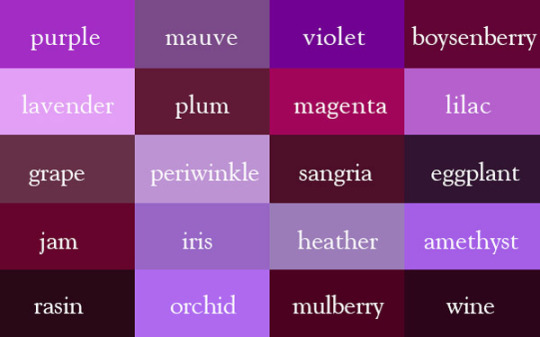
also: berry; amaranthine;
Pink

also: flushed; candy; cherry blossom; petal pink ;
—– source: http://ingridsundberg.com/
—–additional synonyms added by me
240K notes
·
View notes
Text
You’ve heard of one shots, now get ready for none shots! It’s when you think of an idea for a fic and then don’t write it
250K notes
·
View notes
Note
🌻🌼🏵 Send this to ten other blogs you think are wonderful. keep the game going. 🏵🌼🌻
thank you! right back at ya :>
0 notes
Text
Writer friends, I discovered a fun website today. It’s called “I Write Like” and here’s the description:
Check which famous writer you write like with this statistical analysis tool, which analyzes your word choice and writing style and compares them with those of the famous writers.
Let me know which autor you got!
#hm i write like agatha christie!#i pasted 2 pieces and got the same result#so i guess i really do write like agatha christie#fave#save#link#i hope these tags will help me find this later in case i ever search for it
81K notes
·
View notes
Note
hug
So usually when I write I use themostdangerouswritingapp, and when you switch to hardcore mode, the text you write is so blurred you can’t read it and by extention, can’t edit while you write, which is a problem I struggle with a lot. At times, the urge to edit while writing still overwhelms me, so I just delete as much of the sentence as possible (you lose everything if you pause for more than I think three seconds), rewrite it, and hope for the best. When I’m done with a session, I usually just paste it into my document and start a new one without worrying about editing because I know I’m gonna do that later. So when I searched for “hug” in my document, this gem showed up:

Anyway, here’s your sentence:
“Need a refill?”
“I’m good, thanks,” he says and picks up his cup to sip at his rapidly cooling tea. He turns in his seat to watch as Roger picks out the tallest glass and fills it to the brim with water. He digs through the cupboard and retrieves John’s meds, fills and clicks on the kettle, and leans against the counter.
Freddie feels the overwhelming urge to hug him.
9 notes
·
View notes
Text
5 Moral Dilemmas That Make Characters and Stories Even Better
Readers can’t resist turning pages when characters are facing tough choices. Use these 5 keys to weave moral dilemmas into your stories–and watch your fiction climb to new heights.
#1: Give Your Character Dueling Desires
Before our characters can face difficult moral decisions, we need to give them beliefs that matter: The assassin has his own moral code not to harm women or children, the missionary would rather die than renounce his faith, the father would sacrifice everything to pay the ransom to save his daughter.
A character without an attitude, without a spine, without convictions, is one who will be hard for readers to cheer for and easy for them to forget.
So, to create an intriguing character facing meaningful and difficult choices, give her two equally strong convictions that can be placed in opposition to each other.
For example: A woman wants (1) peace in her home and (2) openness between her and her husband. So, when she begins to suspect that he’s cheating on her, she’ll struggle with trying to decide whether or not to confront him about it. If she only wanted peace she could ignore the problem; if she only wanted openness she would bring it up regardless of the results. But her dueling desires won’t allow her such a simple solution.
That creates tension.
And tension drives a story forward.
So, find two things that your character is dedicated to and then make him choose between them. Look for ways to use his two desires to force him into doing something he doesn’t want to do.
For instance, a Mennonite pastor’s daughter is killed by a drunk driver. When the man is released on a technicality, does the minister forgive him (and what would that even look like?) or does he take justice into his own hands? In this case, his (1) pacifist beliefs are in conflict with his (2) desire for justice. What does he do?
Good question.
Good tension.
Good drama.
Another example: Your protagonist believes (1) that cultures should be allowed to define their own subjective moralities, but also (2) that women should be treated with the same dignity and respect as men. She can’t stand the thought of women being oppressed by the cultures of certain countries, but she also feels it’s wrong to impose her values on someone else. When she is transplanted to one of those countries, then, what does she do?
Construct situations in which your character’s equally strong convictions are in opposition to each other, and you will create occasions for thorny moral choices.
#2: Put Your Character’s Convictions to the Test
We don’t usually think of it this way, but in a very real sense, to bribe someone is to pay him to go against his beliefs; to extort someone is to threaten him unless he goes against them.
For example:
How much would you have to pay the vegan animal rights activist to eat a steak (bribery)? Or, how would you need to threaten her in order to coerce her into doing it (extortion)?
What would it cost to get the loving, dedicated couple to agree never to see each other again (bribery)? Or, how would you need to threaten them to get them to do so (extortion)?
What would you need to pay the pregnant teenage Catholic girl to convince her to have an abortion (bribery)? What threat could you use to get her to do it (extortion)?
Look for ways to bribe and extort your characters. Don’t be easy on them. As writers we sometimes care about our characters so much that we don’t want them to suffer. As a result we might shy away from putting them into difficult situations.
Guess what?
That’s the exact opposite of what needs to happen in order for our fiction to be compelling.
What’s the worst thing you can think of happening to your character, contextually, within this story? Now, challenge yourself—try to think of something else just
as bad, and force your character to decide between
the two.
Plumb the depths of your character’s convictions by asking, “How far will s/he go to … ?” and “What would it take for … ?”
(1) How far will Frank go to protect the one he loves?
(2) What would it take for him to stand by and watch the one he loves die when he has the power to save her?
(1) How far will Angie go to find freedom?
(2) What would it take for her to choose to be buried alive?
(1) How far will Detective Rodriguez go to pursue justice?
(2) What would it take for him to commit perjury and send an innocent person to death row?
Ask yourself: What does my character believe in? What priorities does she have? What prejudices does she need to overcome? Then, put her convictions to the ultimate test to make her truest desires and priorities come to the surface.
#3: Force Your Character into a Corner
Don’t give him an easy out. Don’t give him any wiggle room. Force him to make a choice, to act. He cannot abstain. Take him through the process of dilemma, choice, action and consequence:
(1) Something that matters must be at stake.
(2) There’s no easy solution, no easy way out.
(3) Your character must make a choice. He must act.
(4) That choice deepens the tension and propels the story forward.
(5) The character must live with the consequences of his decisions and actions.
If there’s an easy solution there’s no true moral dilemma. Don’t make one of the choices “the lesser of two evils”; after all, if one is lesser, it makes the decision easier.
For example, say you’ve taken the suggestion in the first key above and forced your character to choose between honoring equal obligations. He could be caught between loyalty to two parties, or perhaps be torn between his family obligations and his job responsibilities. Now, raise the stakes—his marriage is at risk and so is his job, but he can’t save them both. What does he do?
The more imminent you make the choice and the higher the stakes that decision carries, the sharper the dramatic tension and the greater your readers’ emotional engagement. To achieve this, ask “What if?” and the questions that naturally follow:
What if she knows that being with the man she loves will cause him to lose his career? How much of her lover’s happiness would she be willing to sacrifice to be with him?
What if an attorney finds herself defending someone she knows is guilty? What does she do? What if that person is her best friend?
What if your character has to choose between killing himself or being forced to watch a friend die?
Again, make your character reevaluate his beliefs, question his assumptions and justify his choices. Ask yourself: How is he going to get out of this? What will he have to give up (something precious) or take upon himself (something painful) in the process?
Explore those slippery slopes. Delve into those gray areas. Avoid questions that elicit a yes or no answer, such as: “Is killing the innocent ever justified?” Instead, frame the question in a way that forces you to take things deeper: “When is killing the innocent justified?” Rather than, “Does the end justify the means?” ask, “When does the end justify the means?”
#4: Let the Dilemmas Grow From the Genre
Examine your genre and allow it to influence the choices your character must face. For instance, crime stories naturally lend themselves to exploring issues of justice and injustice: At what point do revenge and justice converge? What does that require of this character? When is preemptive justice really injustice?
Love, romance and relationship stories often deal with themes of faithfulness and betrayal: When is it better to hide the truth than to share it? How far can you shade the truth before it becomes a lie? When do you tell someone a secret that would hurt him? For example, your protagonist, a young bride-to-be, has a one-night stand. She feels terrible because she loves her fiancé, but should she tell him what happened and shatter him—and perhaps lose him—or keep the truth hidden?
Fantasy, myth and science fiction are good venues for exploring issues of consciousness, humanity and morality: How self-aware does something need to be (an animal, a computer, an unborn baby) before it should be afforded the same rights as fully developed humans? At what point does destroying an AI computer become murder? Do we really have free will or are our choices determined by our genetic makeup and environmental cues?
#5: Look the Third Way
You want your readers to be thinking, I have no idea how this is going to play out. And then, when they see where things go, you want them to be satisfied.
There’s a story in the Bible about a time religious leaders caught a woman committing adultery and brought her to Jesus. In those days, in that culture, adultery was an offense that was punishable by death. The men asked Jesus what they should do with this woman. Now, if Jesus had told them to simply let her go free he would have been contravening the law; if, however, he told them to put her to death, he would have undermined his message of “forgiveness and mercy.”
It seemed like a pretty good trap, until he said, “Whoever is without sin among you, let him cast the first stone.”
Nicely done.
I call this finding the Third Way. It’s a solution that’s consistent with the character’s attitude, beliefs and priorities, while also being logical and surprising.
We want the solutions that our heroes come up with to be unexpected and inevitable.
Present yours with a seemingly impossible conundrum.
And then help him find the Third Way out.
I hope this helped! I’ve been really busy today, seeing how my mom had surgery and I’ve been trying to continue writing my novel today as well. I thought I’d squeeze in some more stuff for you guys!
If you have any questions or just want to talk, feel free to visit my ask box!
#i didnt even read this but some of you might find it useful idk#just trying to keep this blog alive
62K notes
·
View notes
Text
reblog and put the cutest romantic gesture you’ve ever read in a fic in the tags
#first thing that comes to mind is sherlock playing the violin for john even though his arm was hurt#it's from the progress of sherlock holmes which is one of my favorite fics ever
152 notes
·
View notes
Text
When you are writing a story and refer to a character by a physical trait, occupation, age, or any other attribute, rather than that character’s name, you are bringing the reader’s attention to that particular attribute. That can be used quite effectively to help your reader to focus on key details with just a few words. However, if the fact that the character is “the blond,” “the magician,” “the older woman,” etc. is not relevant to that moment in the story, this will only distract the reader from the purpose of the scene.
If your only reason for referring to a character this way is to avoid using his or her name or a pronoun too much, don’t do it. You’re fixing a problem that actually isn’t one. Just go ahead and use the name or pronoun again. It’ll be good.
141K notes
·
View notes
Text








Some of my favorite pics of Roger and Brian cos I’ve been hit by strong feelings about their friendship tonight.
You know what I mean, right @melisa-may-taylor72?
2K notes
·
View notes
Note
do you ever look at your cat and wonder how someone so perfect exists
yes
1 note
·
View note
Text
well still lost half of it. im STUpid
I got started on a new chapter for sparks fly and just deleted the whole thing by mistake :/
2 notes
·
View notes
